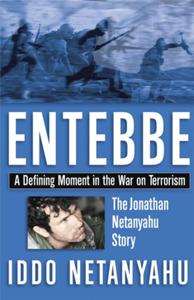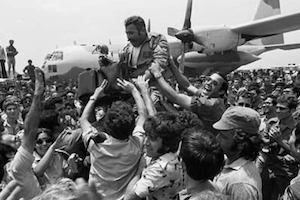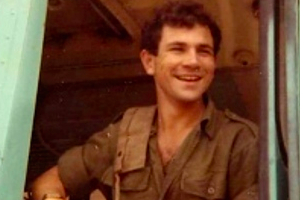Entebbe: A Defining Moment In the War On Terrorism by Iddo Netanyahu

On July 4, 1976, Israeli forces conducted one of the most successful military operations in the nation’s history, to rescue civilian hostages held by terrorists at the Entebbe Airport in Uganda. This long-distance raid is viewed as one of the important successes of anti-terrorist operations during the 1970s, and provided an example that other nations could adopt in future in anti-terrorist operations.
Initially providing a basic overview of the overall events, from the hijacking of the aircraft to the return of the hostages and military forces to Israel, Netamuahu directs his attention towards a more in-depth look at the political and military events that occurred prior to the government’s approval of the raid as well as an examination of parts of Yoni’s military career, his philosophy, and the “myth” surrounding his death.
In discussing the raid, Netanyahu provides a picture of the chaos that occurred during the assault, noting that various commandos missed their assigned tasks while others were able to overcome the mistakes. Most significantly, he discusses his brother’s death: movies about the operation often present Yoni as being killed close to the end of the raid, and as being shot by someone in the air traffic control tower. However, Netanyahu notes the claims of various participants that Yoni was shot and mortally wounded prior to Israeli forces entering the terminal, and that he was shot by forces on the ground.
Iddo Netanyahu is an Israeli physician, author and playwright. He is the younger brother of Benjamin Netanyahu, current Prime Minister of Israel and Yonatan Netanyahu, killed in the Entebbe hostage rescue. He has an MD from Hebrew University of Jerusalem School of Medicine and did post-doctoral training at Georgetown University Hospital, and Mount Sinai Medical Center.

Read More About Entebbe: A Defining Moment In the War On Terrorism
10 Discussion Questions to Explore Entebbe: A Defining Moment In the War On Terrorism by Iddo Netanyahu
- Iddo Netanyahu set out to memorialize his brother Yonatan’s death at Entebbe by writing Entebbe, A Defining Moment in the War on Terrorism. What do you think he was feeling as he interviewed each of the other soldiers that participated in the operation so many years before?
- What level of faith, compassion, and courage must a soldier possess based on Netanyahu’s description of all that went into planning and executing the rescue of the Jewish and Israeli hostages being held by terrorists?
- Do you think the raid on Entebbe changed the way the international community perceived the Israel Defense Forces? If you were old enough to understand world events in 1976, did this rescue mission change your personal perception of the IDF?
- Yonatan Netanyahu is described as something of a biblical hero of the Jewish people throughout the book. His perseverance and dedication to bringing the hostages to safety is felt throughout the story. I was moved when he said, “I believe in Israel, and in the sense of collective responsibility that must accompany every man fighting for the survival of his country” on page 117. Did you find a passage in the book that best captured his determination for you?
- From relying on a guidebook of world airports, using tarp to “build” the Entebbe airport terminals to spray painting an old mercedes to trick the Ugandan soldiers, Netanyahu’s description of the planning of this mission demonstrates how far fetched and dangerous this rescue op truly was for all involved. Were you surprised by the level of makeshift props and procedures that describe this mission?
- Netanyahu explains that the Israeli government's approval of this mission was one of the bravest they had made in the history of modern Israel. What do you think convinced them to allow their top fighters to fly a couple thousand miles away to a foreign land and risk taking on the Ugandan army in an effort to rescue one hundred people? Netanyahu writes, “Success depended on absolute surprise. If the terrorists had even one minute’s warning, they could kill all the hostages with a few grenades and some bursts from their AK-47’s, and when the troops arrived, there would be no one left to save.” Based on the minimal intelligence reports and the overwhelming risks to the IDF soldiers and the hostages, if you had been in the room when the vote was taken how do you think you would have voted?
- What did you think of Netanyahu’s description of his brother’s death? Were you surprised by the simplicity with which this tragedy is shared with us? Netanyahu seems to keep his focus on the rescue mission seemingly as Yonatan would have wanted him to do.
- A few of the IDF soldiers who participated in the rescue describe the hostages as bewildered, confused and oddly focused on bringing their belongings with them even though they were instructed to leave everything where it was and follow their rescuers out to safety. We learn that after being held by murderous terrorists for a week, many believed they were going to be killed in Entebbe. Is it possible that their wanting their bags with them helped them cling to their humanity, to their inherent knowledge that they were being rescued and that they would return to life after living for several days in the clutches of death?
- What does this book teach us about Anti-Semitism and Anti-Israel hatred and the need to be able to protect our own? The hostages separating the Jewish people from the other hostages (the non-Jews were freed early on by the terrorists) certainly conjured up images of the Holocaust and there was at least one hostage who had survived the Nazi concentration camps. Is this rescue mission in line with Theodore Herzl’s vision of a Jewish State where the people would be governed by their brethren?
- Iddo Netanyahu published this book in 2003, just two years after the September 11 attacks on the United States of America, attacks that facilitated a turning point in the American perception of the war on terror. What do you take away from this book in regards to the Western approach to battling terrorists? With Hamas, Hezbollah, Al Qaeda, ISIS, and countless splinter groups currently targeting Israel, the United States of America, and all those around the world who believe in freedom, we could use many more Yonatan Netanyahu’s and the members of the IDF’s Unit to keep us safe.
The Reading Israel Book Club's Book of the Month
Every month, the Reading Israel Book Club at Israel Forever brings you a new literary delight to grow your Israel connection through the written word.
We hope that you enjoy our selections and participate in discussion not only with your friends and family but with an international community of readers in our open discussion group on Facebook.



